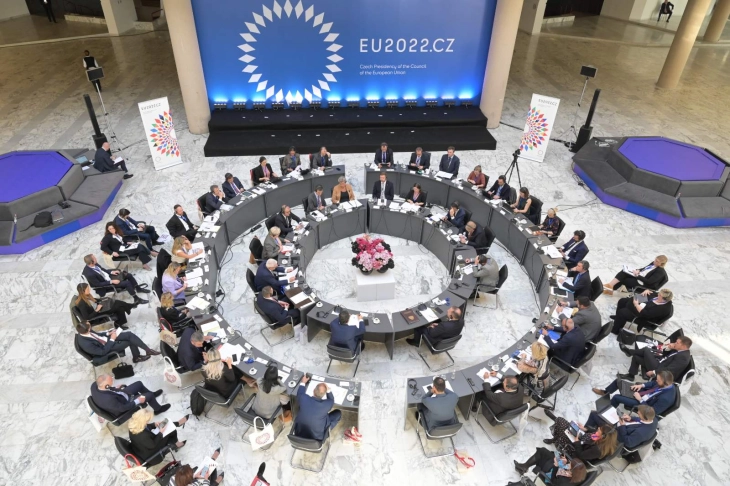Spasovski addresses EU-Western Balkans Justice and Home Affairs Ministerial Forum in Tirana

Skopje, 3 November 2022 (MIA) – Interior Minister Oliver Spasovski, who is taking part Thursday in the EU-Western Balkans Justice and Home Affairs Ministerial Forum held in Tirana, delivered remarks in the first session on cooperation in addressing the security impact from the Russian aggression against Ukraine.
He underscored that the Russia’s military aggression against Ukraine at this moment has no direct reflection on the situation with organized and serious crime in our country.
“The number of Ukrainian refugees and families who sought refuge in the Republic of North Macedonia is still small, unlike the neighbouring countries of Ukraine, primarily the EU member states. The secondary effects, i.e., the indirect consequences, are mainly felt from the war in Ukraine. The Ministry of the Interior continuously monitors the overall situation in relation to the conflict, and for this purpose a crisis staff has been established which monitors the security situation and at the same time analyzes all reports and information on the situation with Ukraine,” Spasovski said, Interior Ministry said in a press release.
He added that organized crime and all its forms are flexible and dynamic, and therefore quickly adaptable to new developments related to Russian aggression, such as arms smuggling, excise goods, misuse of Ukrainian documents in connection with migrant smuggling and illegal drug trafficking.
Minister Spasovski said that within the framework of the area of illegal trade in weapons, in the Republic of North Macedonia this year, as of September 2022, 142 crimes were discovered, for which a total of 145 perpetrators were criminally reported, which is a 10 percent increase compared to last year.
He underscored that the activities undertaken by the EMPACT support team by mobilizing this platform to deal with threats arising from serious and organized crime and related to the war in Ukraine are remarkable.
“There is no doubt that in recent years cyber threats are among the most significant security threats and therefore they are rightfully treated as an integral part of national and international security. The defence and security sector is increasingly dependent on function of ICT systems. Cyber-attacks on key computing systems can actually cause more damage than even classic military attacks,” Spasovski noted.
He also underlined that currently, the Republic of North Macedonia is implementing the National Cyber Security Strategy 2018-2022, which was developed based on the principles of the Cybersecurity Strategy of the European Union and the NATO Cyber Defence Pledge, to ensure safe, secure, reliable and resilient digital environment, for the benefit of citizens, businesses and public administration. Also, National Cyber Security Council was also established, according to the latest NATO standards, composed of members from several relevant institutions in the Republic of North Macedonia.
Minister Spasovski also referred to the activities that the Republic of North Macedonia, together with its partners, undertakes in the fight against terrorism and in the prevention of radicalization, including that through the Internet, through the involvement of local self-government, the establishment of prevention councils and action teams in local communities, as well as involvement of the non-governmental sector, religious communities, the media, the business community.







